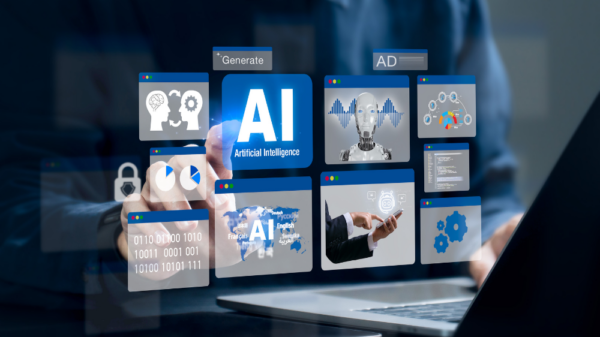At the U.N. climate talks in Brazil, the role of artificial intelligence (AI) has emerged as a double-edged sword in discussions regarding climate change. During the COP30 conference, various tech companies and countries highlighted AI’s potential to aid in combating global warming, a challenge largely associated with the burning of fossil fuels such as oil, gas, and coal.
Proponents argue that AI can significantly enhance the efficiency of electrical grids, assist farmers in predicting weather patterns, and track migratory species in deep-sea ecosystems. Additionally, AI can help design infrastructure resilient to extreme weather events—capabilities that could prove vital as climate challenges escalate.
However, climate advocacy groups are raising alarms about the environmental implications of AI’s increasing energy consumption. They argue that an unregulated AI boom could derail global efforts to meet the targets set by the 2015 Paris Agreement to mitigate climate change. Jean Su, the energy justice director at the Center for Biological Diversity, emphasized, “AI right now is a completely unregulated beast around the world.”
Despite these concerns, there are voices within the tech industry that view AI as a significant enabler for sustainability. Adam Elman, director of sustainability at Google, described AI as “a real enabler” that is already showing positive impacts in the field.
Consensus seems to form around the idea that AI is a permanent fixture in the discourse on climate change. Michal Nachmany, founder of Climate Policy Radar, noted the “unbelievable interest” in AI at COP30, adding, “Everyone is also a little bit scared. The potential is huge, and the risks are huge as well.”
AI’s Growing Role in Climate Solutions
According to Nitin Arora, who leads the Global Innovation Hub for the U.N. Framework Convention on Climate Change, the conversation around AI is becoming increasingly prevalent at international climate summits. Launched at COP26 in Glasgow, the hub aims to promote scalable ideas and solutions that have, so far, been largely centered around AI. The Associated Press reported at least 24 sessions related to AI in the first week of the Brazil conference, including initiatives like AI assisting cities in sharing energy and predicting forest crime locations.
One notable accolade at COP30 was the inaugural AI for Climate Action Award, which recognized an AI project addressing water scarcity and climate variability in Laos. Additionally, Johannes Jacob, a data scientist with the German delegation, is developing a prototype app named NegotiateCOP to aid smaller countries like El Salvador and South Africa in processing numerous official COP documents, aiming to “level the playing field in the negotiations.”
In discussions involving major AI firms like Nvidia, opinions varied on the responsible use of AI in addressing climate challenges. While Elman stressed the necessity of responsible AI deployment, Nvidia’s head of sustainability, Josh Parker, referred to AI as “the best resource any of us can have,” arguing that it democratizes solutions to sustainability challenges.
Princess Abze Djigma from Burkina Faso echoed this sentiment, calling AI a “breakthrough in digitalization.” However, concerns about the ethical and environmental implications of AI persist. Bjorn-Soren Gigler, a senior digital and green transformation specialist with the European Commission, acknowledged the dual nature of AI, citing both opportunities and significant environmental concerns.
The Environmental Footprint of AI
AI’s power-intensive data centers are a significant part of this conversation. The International Energy Agency reported that data centers accounted for approximately 1.5% of global electricity consumption in 2024, with their energy needs growing by around 12% per year since 2017—outpacing overall electricity consumption by over four times.
Moreover, Su highlighted that the operations of these data centers necessitate substantial water consumption, particularly in regions already facing water stress. She warned that the surge in AI’s energy demands could exacerbate greenhouse gas emissions, potentially hindering U.S. climate goals given its historic role as a major polluter.
In response, environmental groups at COP30 are advocating for regulations that could mitigate AI’s environmental impact. These include public interest testing for proposed data centers and mandates for 100% on-site renewable energy. “COP cannot only view AI as some type of techno-solution; it has to understand the deep climate consequences,” Su concluded.
As COP30 progresses, the discussions surrounding AI’s role in climate response will likely continue to evolve, revealing both its transformative potential and the pressing need for regulatory frameworks to ensure sustainable deployment.
See also Andrometa Launches YapWorld, Pioneering the “Social AI” Sector to Combat Digital Isolation
Andrometa Launches YapWorld, Pioneering the “Social AI” Sector to Combat Digital Isolation Microsoft Launches Foundry Overhaul with IQ Tools to Simplify AI Agent Management
Microsoft Launches Foundry Overhaul with IQ Tools to Simplify AI Agent Management McGill University Health Centre CEO Discusses AI Risks and Tech Adoption Strategies
McGill University Health Centre CEO Discusses AI Risks and Tech Adoption Strategies Check Point Partners with Microsoft to Secure Copilot Studio with AI Guardrails
Check Point Partners with Microsoft to Secure Copilot Studio with AI Guardrails Ceva Shares Plunge 14% Despite Winning 2025 IoT Edge AI Excellence Award
Ceva Shares Plunge 14% Despite Winning 2025 IoT Edge AI Excellence Award




































































